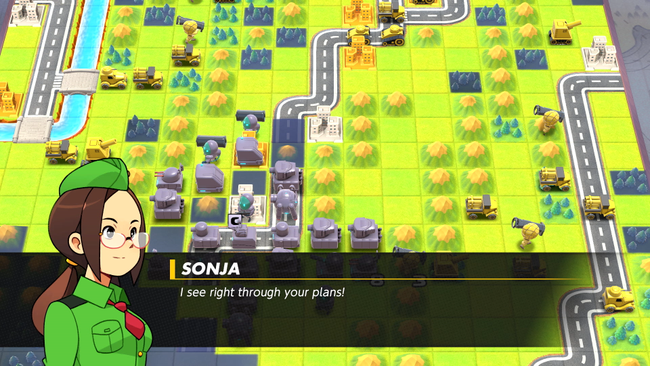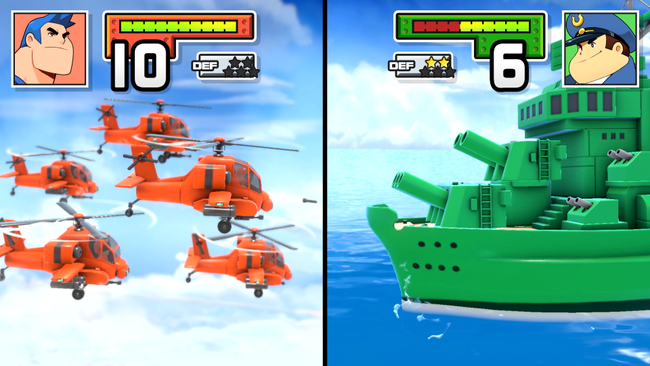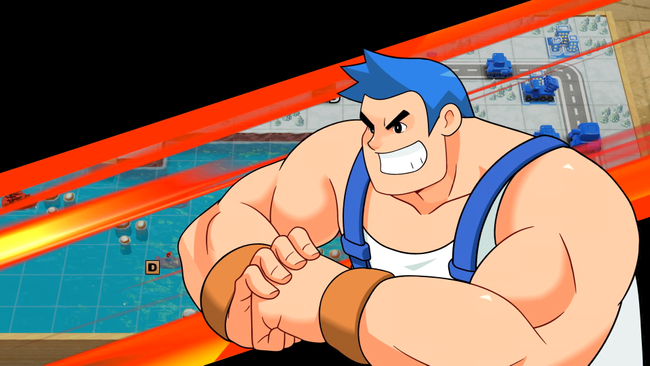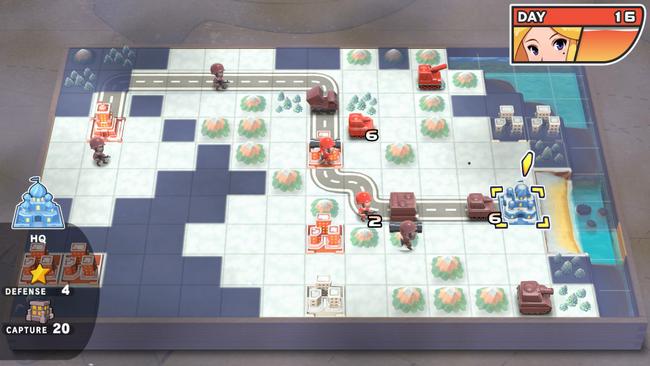
Advance Wars 1+2 Re-Boot Camp Review
Timing is important. In concerns both extraordinary and mundane, when and how we do things matters. Things go in the oven for so long; rhythm games display their prompts just so; and even relationships can hinge on the time and place of two strangers. For a video game, the timing of the game itself - its release date, to be exact - can mean everything.
Advance Wars 1+2 Re-Boot Camp, a top-down remake of two Game Boy Advance strategy RPGs delivered in one package for the Switch, knows this all too well. Initially slated for December 2021, the game was delayed until Spring 2022. The release window came with another delay issued by Nintendo due to "recent world events." Now it debuts on April 21, 2023, nearly a year and a half after the original release window. In that interval, Switch owners have been dazzled with some spectacular strategy RPGs.

The story of Advance Wars is simple enough: players initially control Andy, a new Commanding Officer ("CO") for the Orange Star Army. The country of Orange Star is defending itself from an invasion from neighboring territory, Blue Moon. Andy will recruit additional COs during his travels through the region, including Green Earth and Yellow Comet. Andy and company eventually learn the machinations behind the war, leading into the sequel, Advance Wars 2: Black Hole Rising.
The story is mostly told through short exchanges between battles, leaving most of the game's events being relayed to the player secondhand. The tale of war between two neighboring countries is compelling enough, and certainly warrants some of the comparisons made to real life events when the game was delayed last year. However, the story leans into science-fiction plot twists rather quickly, with a narrative that matches the anime-inspired stylings. It was difficult to be fully engaged with the thin plot, as each new development reminded me of the real-life war which presumably led to the year-long delay. With every surreal plot twist, the notion of delaying this game because of real events came across as increasingly implausible.
This remake fully embraces the game's heritage, similar to the recent Front Mission 1st: Remake. As it is a faithful remake, Re-Boot Camp feels like a vintage strategy RPG. However, it does provide a lengthy tutorial for new players. The first handful of missions slowly introduce the game's mechanics, allowing players to familiarize themselves with unit types and location types. There are no individual characters to control. Instead, human or vehicle units are deployed on the map. Players are introduced to a small sample of units at first, with subsequent missions introducing new units - tanks, missiles, and eventually bomber jets, submarines, and more. It can feel overwhelming at first, but the onboarding is gentle enough to allow the players time to digest the eventually dizzying number of units available during each mission, with objectives including capturing an enemy base or protecting particular units.

Moreover, additional mechanics continue to be introduced. An early example would be bases: during the first few missions, players are unable to determine units before battle or summon new ones mid-battle. Enter bases - fixed locations on the map which, when captured, can deploy new units at the player’s instruction, so long as they have the coin. As units capture buildings on the map, it generates additional income for the CO each turn, refilling their coffers and allowing them to hire more units. Budgeting is only so important, as leftover funds are not carried over into the next mission.
Advance Wars eschews other popular genre conventions as well. Units do not gain experience points, do not have individual levels, and do not learn abilities. There is no basis for grinding in this game, because the focus is on exploiting the strengths and weaknesses of units through the game’s roshambo-inspired combat. Instead of allowing players to brute-force their way through the game through overwhelming strength, Advance Wars 1+2: Re-Boot Camp much prefers to guide players through trial and error. If I sensed I made a tactical error, it was easier to wave the white flag and start again with the knowledge gained during this run, as well as the tips issued by Nell after defeat. Better yet, most failure was met with an eagerness to retry and prevail.
Recruiting new COs and unlocking new units while advancing through the story provides a feeling of progression, but the absence of markers for unit progress diminishes this feeling somewhat. The characters don't feel any stronger at Mission 17 than they did at Mission 7. In this sense, Re-Boot Camp feels less like a strategy-focused RPG and closer to a board or puzzle game played with a screen instead of at a table.

The cute, colorful graphics pop off the screen with a pleasant approach that could have used a bit of refinement to avoid the inevitable comparisons to a mobile title. Military locations look akin to Monopoly houses, and units with faces trigger flashbacks to the customizable Miis from the Wii U and 3DS era. Each CO has a special ability that when triggered, treats the viewer to a heavily stylized animation that is right at place with the character designs. Likewise, the combat sequences are colorful, if a bit uninspiring. The game allows players to bypass these entirely to speed up battles a touch, which is helpful as some missions can carry on for quite a while.
Each CO is given their own battle theme, congruent with their personality that adds a nice touch of characterization. The songs present match the colorful whimsy of the graphics, boasting some jazzy menu tunes and some moody combat themes. The musical presentation is also elevated from its origins on the Game Boy Advance, ditching chiptunes for livelier arrangements. One drawback, however, is how repetitive some of the tracks can become during longer sessions. Players are given the option to toggle the music off in battle, a nice touch for those who aren’t terribly interested in the music.
Outside of the story, there are a number of multiplayer features which make the game exceedingly replayable. The Design Room has returned, allowing players to create and share their own custom maps. The feature is deeply customizable and engaging, preemptively answering the question of what it would look like if Mario Maker and Fire Emblem had a baby. There is also local co-op, allowing up to four players to play the game on one console, as well as online multiplayer components. Online and Local co-op is very fun, although playing with others on one shared console reinforces the board game feel of the title. Eager combatants are also able to visit the War Room, where missions can be replayed against the computer. One tricky thing about online, though: the game sequesters all online functionality so that you are only able to play with people you’ve exchanged friend codes with, limiting the possibilities to play with, and share maps with, other gamers.

The Advance Wars series is a classic, and this remake is a great reminder of why. The cartoonish aesthetic and cheery music belie the densely layered game mechanics and deep strategy required to prevail. Frankly, the worst thing about this game is its timing. Since Re-Boot Camp was announced, strategy RPG fans on the Switch have been treated to a handful of stellar titles.
Newcomers to the series may not find the charm in the graphics or music, and others may balk at the price tag for this collection, especially with juggernauts like Tactics Ogre Reborn and Fire Emblem competing for attention. Still, it’s hard to argue with a collection like this. A sleek, yet imperfect presentation coupled with dozens of single and multiplayer missions make Advance Wars 1 + 2 Re-Boot Camp engaging and addictive, for veterans and new recruits alike.